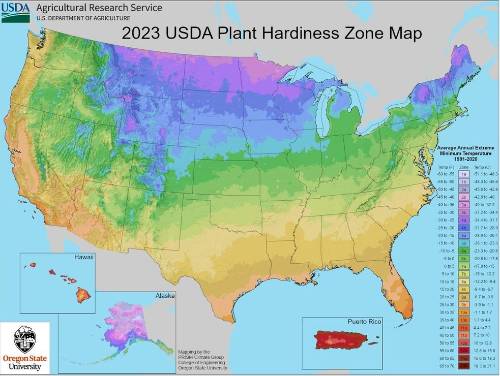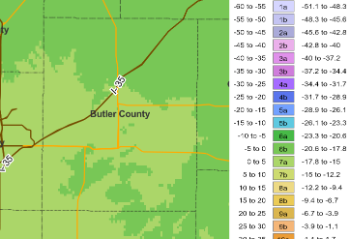USDA Plant Hardiness Zone Map Update 2023

The USDA released a new Plant Hardiness Zone Map for the United States, the first update to this map since 2012. The 2023 map is based on 30-year averages of the lowest annual winter temperatures at specific locations, divided into 10-degree Fahrenheit zones and further divided into 5-degree Fahrenheit half-zones. The 2023 map incorporates data from 13,412 weather stations compared to the 7,983 used for the 2012 map. Plant hardiness zone designations represent what’s known as the “average annual extreme minimum temperature” at a given location during a particular period (30 years, in this instance). Put another way, the designations do not reflect the coldest it has ever been or ever will be at a specific location, but simply the average lowest winter temperature over a specified time. Low temperature during the winter is a crucial factor in the survival of plants at specific locations.
What does that mean for gardeners in Butler County? In the 2012 version Plant Hardiness Zone Map, our county was divided into zones 6a and 6b. With the update to the map, the county is now in zones 6b and 7a. While El Dorado and the central part of the county stayed in the same zone, the northern and southern parts changed by a half-zone warmer. In general, this update means that we should be able to grow zone 7 plants that require a slightly warmer winter temperature, but I would consider them marginally hardy in our area. You may get away with those plants for a few years, but we may still get the odd winter with extremely cold temperatures. I do want to note that the map does not show microclimates. A microclimate is a local set of atmospheric conditions that differ from those in the surrounding areas, often slightly but sometimes substantially. The term may refer to areas as small as a few square yards or smaller to as large as many square miles. The interactive map may be found here: https://planthardiness.ars.usda.gov/
version Plant Hardiness Zone Map, our county was divided into zones 6a and 6b. With the update to the map, the county is now in zones 6b and 7a. While El Dorado and the central part of the county stayed in the same zone, the northern and southern parts changed by a half-zone warmer. In general, this update means that we should be able to grow zone 7 plants that require a slightly warmer winter temperature, but I would consider them marginally hardy in our area. You may get away with those plants for a few years, but we may still get the odd winter with extremely cold temperatures. I do want to note that the map does not show microclimates. A microclimate is a local set of atmospheric conditions that differ from those in the surrounding areas, often slightly but sometimes substantially. The term may refer to areas as small as a few square yards or smaller to as large as many square miles. The interactive map may be found here: https://planthardiness.ars.usda.gov/

Have questions? Contact our office where our Horticulture Extension Agent will assist you with questions.
Phone: (316) 321-9660
Email: callae@ksu.edu